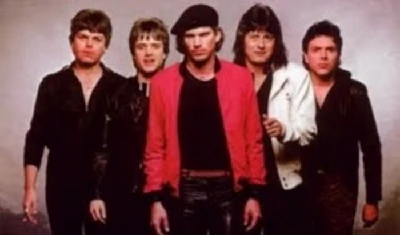published: 24 /
9 /
2009

Songwriter and musician Jim Peterik was a member of both the Ides of May and also Survivor, who had a worldwide hit with 'Eye of the Tiger', the theme tune to Sylvester Stallone's 'Rocky III', in 1983. In the first part of a two part interview, he speaks to Lisa Torem about both bands...
Article
An afternoon with rocker Jim Peterik defies rhetoric. The moment I enter his home, all senses reverberate. First, I’m deliriously lost in the valley of pristine, immaculately polished electric Gretsch, Gibson and Fender electric guitars that are showcased on the living room floor in his suburban fortress in the outskirts of Chicago.
Many are proudly exhibited, lined up like enthusiastic young soldiers engaged in a military basic training program. Several shimmering beauties hang from strategic places on the wall of his Lennon’s Den recording studio downstairs.
Jim murmurs, “I love my guitars” or something similar. And there’s so many of them, I wonder if they come to life at night – like the characters in the ‘Nutcracker Suite’ - and clamour for his calloused fingers.
A random bin of percussive instruments peek out from under a wooden buffet. The tambourine, the most prominent, teeters over the edge of the container, possibly awaiting examination or an eager palm.
His home is bathed in light – generous flashes stream from skylight windows which you enter along a pathway strewn with lush foliage surrounding a trickling, babbling stone water fountain.
Jim, the quintessential rocker, greets me warmly and introduces me to his stunning wife Karen. I’m here to interview Jim and attend a session. He knows my first and last name.
His white straw fedora has a blueish-green plaid sash around its circumference,. Aquamarine trousers are supported with a peace-symbol buckle. Are those diamond studs that decorate this black leather belt?
Strong tan arms erupt from a sleeveless vest, a silver creature dangles from a chunky chain around his neck. Rectangular frames don’t distract from his vigilant “third eye.” Peterik takes in all that he sees, each detail, even before we begin. As if this isn’t enough, the outlandish toes of his white leather boots extend way beyond the normal range of 9-5 wear.
Jim Peterik, Chicago-born, singer/guitarist/keyboard player and above all, songwriter, first realized fame as the lead vocalist, songwriter, guitarist and keyboard player for classic rock group, the Ides of March. Their 1970 hit ‘Vehicle’ topped the charts.
A decade later, Peterik co-wrote ‘The Eye of The Tiger’(‘Eye of The Tiger’, ’82) with Survivor bandmate Frankie Sullivan. (Peterik co- wrote numerous hits for Survivor and played keyboards). This Grammy-award winning song moved the action forward in the popular American film ‘Rocky III.’ which subsequently became a much-loved global hit.
He pioneered the World Stage Project - inviting other artists to perform duets with him on-stage and founded Jim Peterik’s Life Force a ‘smooth jazz’ group featuring vocalist Lisa McClowry, and rock group Pride of Lions – featuring vocalist Toby Hitchcock –who are soon to release a fourth album.
Peterik also fulfilled his own life-long dream when collaborating with Brian Wilson on 'Dream Angel,' (written for Wilsons' daughter) for Wilson's second solo album (Brian Wilson, 'Dream Angel', Wilson/Thomas/Peterik,'Imagination' '98).
Jim shows me his juke box – a throwback to the fabulous 50s – which heralds his greatest hits. If we weren’t short on time, I’d be happy rummaging through my pockets for quarters, exploring his musical legacy through this antiquitous, anachronistic and joyful medium.
In Lennon’s Den there’s the expected neatly framed picture of his hero and to the left another Lennon portrait, this time his arm slung around a homeless man’s shoulder against the backdrop of a New York City street.
Another framed visual proclaims, ‘Best Rock Performance of a Duo or Group with Vocal’ on the Grammy-award winning ‘Eye of The Tiger,’ Survivor, Awards Year 1982’
Near that stands a charming visual of Elvis Presley, then a dramatic, colourful painting of a sax and keyboard player. Jim’s dad played saxophone. As a boy of eight, he followed him around in the clubs.
But these visuals are teasers, pre-cursers to the life-sized photos of Jimmy Page, Bob Dylan and Jimi Hendrix. If you don’t cherish rock, stop reading lest you get caught up in this completely intoxicating mire. If you’re game, sit back. Jim Peterik’s your ‘rock-solid’ vehicle - he’ll ‘take you anywhere you want to go.’
In Lennon’s Den Chicago Cats’ Richie Davis strums guitar, while Larry Millas, long-standing 46 year member of Ides of March, wearing a white oxford shirt, shorts and sneakers - engineers today’s session.
Marzette Griffith, vocalist and former Essence member, listens to his vocals on a recent recording. Wearing a navy blue jogging suit and baseball cap, he leans against a stool – a short distance away from the others – gathering perspective. Jim’s written tunes for Marzette’s albums – they go way back.
From my front-row seat I watch Millas, Davis and Peterik huddle around each other like three wise men debating biblical liturgy or rapt surgeons in the emergency room detailing heart transplant procedures. While each musical segment plays back, six shoulders groove to the beat - Davis provides hefty guitar fills over the existing track.
“How funky do you want it? Mix-up comping and a few riffs?” asks Davis.
Jim nods – “Good take, go to the end,” says Millas.
“One weak moment,”says Jim, physically indicating exactly where to insert fills. “Let’s go with Mister Funk. I can hear this all over ‘Smooth Jazz.’”
The three-headed consortium bops along - a dreamy formula ensues. Listen, back-track, reach a consensus. It goes down smoothly like a white Russian, but with an addictive after-taste worthy of intense concentration – like a cold shot of Stoly. .
“Let’s get the hook-up to the second chorus. Now, the breakdown right there,” says Jim.
The surgical team consolidates, maintaining vigilant communication. Their ears scalpels, their shoulders and feet the anesthetic.
“Yeah, baby, I was hypnotized. I just didn’t want to leave - show you the place that’s not working for me… ,” says Jim.
“She got a body like an upright bass, straight, legit, like a Coltrane riff, jazzy lady, you’re my baby… .”
Jim says, “Okay, Lar, could you bring up the side vocals? When I do that sax riff, I get goosebumps way back. I know it’s working… .”
I flinch and mouth the words to Marzette, “Jim’s playing sax?” He grins.
When Jim leaves the room the guys talk about how they met Jim, what a good guy he is, the mutual friends they all know and who has got what equipment.
Sitting next to Larry, Jim says, “The lyrics conflict too much - I want the vocals out.”
Larry says, “It’s different melodies. Are you thinking it might be okay?”
Jim says, “Why don’t we have lunch, come back, listen and bounce?” It’s a wrap.
A spinach wrap is what Jim orders at the Moondance Diner - he knows all the servers and kibbitzes with them. Van Morrison’s lyrics are stencilled on the walls, and Lennon’s voice is heard above the din.
I’m floating in rock star heaven and this ‘Vehicle’ icon has even promised me a ride back to the train station. As his idol once wrote, “It’s getting better all the time.”
PB: Hi Jim. Let’s talk about some memories of the past.
JP: Surprise me.
.
PB: What led to ‘Eye of The Tiger?’ and your relationship with the ‘Rocky’ movies?
JP: That was an interesting story, of course. The phone call that changed my life came when Sylvester Stallone called. It turns out that he was friends with the president of our record company, Tony Scotti. We were on Scotti Brothers Records.
Frank Stallone (Sylvester Stallone’s brother) was a very good friend of Tony Scotti and Sylvester as well and one day Tony played Sylvester this new band he signed called Survivor. He played him some of the songs from the second album, and one song in particular called ‘Poor Man’s Son’ (‘Premonition’, ’81) which has a very kind of raw, street kind of sound.
Stallone goes, “Wow.” This would be perfect for my new movie, ‘Rocky III’ and I’m looking for the title song, so, all of a sudden I come home from doing some errands, turn on my answering machine, and there’s the voice on my answering machine.
“Yo, Jim, give me a call. It’s Sylvester Stallone. That’s a nice answering machine you got there.”
I said, “Yeah, right. Someone’s putting me on there.”
But, it really did sound like him and Frankie, my partner in the band, lead guitarist, Frankie Sullivan, came over. He returned the call – sure enough, Stallone answered. Real nice guy. He said, “Call me Sly.”
He’s got this new movie called ‘Rocky III’. He said we don’t want to use the old ‘Gonna Fly Now’ theme – we want something for the kids, something with a pulse, something modern.
We were just blown away that we were talking to Stallone. He was a hero of ours. We loved the first ‘Rocky’ so much. He said, I’m going to send you guys the first three minutes of the movie – and that’s the place where I want you to write the theme song.
The next day we rented a Betamax machine. The tape arrived in La Grange, Illinois. We just watched the energy and got very excited. We watched Mr. T rising up and Stallone is a little soft with his success. Then, we watched the punches being thrown.
I immediately just took my electric guitar and started this sixteenth note – digga digga digga – saw the punches being dropped – and – Bop Bop Bop. I’m literally, just playing guitar to the action on the screen. But, we couldn’t get much further with it – because we needed to see the whole movie.
Called Stallone and begged him to send us the whole movie which they were reluctant to do. They didn’t like to give movies out at the time before they figured it would get in the wrong hands.
We promised we’d send it right back – they sent us the whole movie – two days later. We saw the whole thing. That’s when the story began to take shape. We saw the underdog rising up and we saw the whole dichotomy of Stallone temporarily losing his passion – he got it back in the movie – but, he was losing it.
Then we hear the dialogue and Burgess Meredith (who plays Rocky’s coach) says, “Rocky, you’re losing the eye of the tiger.”
So, that was already in the script - that phrase. When we were writing the song, I said, “Frankie, we have got to call this thing ‘Eye of The Tiger.’”
So, we started writing – I was at the piano, Frankie was on the guitar. I still have a cassette tape of us writing that song. It’s a real good primer of how a song is written if you think about it.
Over the next week, we finished the lyric, recorded it, edited it in a studio in Chicago. We demoed it, called it a ‘demo’ which it really was. Stallone got it. He just absolutely fell in love with it.
He said, write me a third verse, because what he had done with the demo was repeated the first verse as the third verse. “You’ve got to write me the third verse,” he said.
We kind of took pieces of the first verse –changed some of the lines and made a third verse. He loved it. Next thing I got pneumonia and Frankie went to L.A. to work with Stallone, putting the song in the movie itself. So, I missed that juncture.
But, apparently they were in such need to get this out that they used the actual demo. So one very little known fact is that there are two versions of the song. They’re very, very, very similar. It would take a musical expert to see the difference.
But one is in the movie and one is on the soundtrack album and, of course, on our album called ‘Survivor – Eye of The Tiger.’
They’re two different versions and I tell you how difficult it was to make the final version as good as the one on the film. Just because when you first write a song you have that new found passion for the song – it’s all on fire.
We call it “chasing the demo.” A lot of times you’re “chasing the demo.” to get that magic back. We finally did but it took an awful lot of time to re-cut it – we re-cut it because we thought the sound of the demo was not as good as it could be.
The one you hear on the radio is not the one in the movie – it’s the final. Song goes up – stays number 1 on Billboard for seven weeks. We’re on the road at this time with Reo Speedwagon – opening up for them – not knowing that we’ve already sold out all the tickets.
We were the hot thing right then. The ‘Tiger’ t-shirts were just flying off the merchandise table. It was unbelievable. After every show we’d get a packet of money - just cash from the merchandise. This is cool, but it was quite a ride.
PB: How old were you at this point?
JP: 31. 1982. Frankie had to be more like 25. So we were just cutting our teeth, you know?
PB: That’s an amazing story. Looking back, a little further, you achieved success with Ides of March and ‘Vehicle’ at 19.
JP: 19
PB: So young to be getting a hit record…
JP: It was like, wow - like we couldn’t believe it. We had been playing the song ‘Vehicle’ at the sock hops and teen clubs and we were always amazed at the response to this song. We didn’t really value it too much. We just thought it was another song. But, every time we played it the dance floor filled up. So, our producer/manager cut three things that we were really high on – we demoed and the band said, “Why don’t you cut that ‘Vehicle’ song?”
“That? That’s a live song – that’s just for the dancers,” I said.
“No, cut it,” they said. So, we cut it and, of course, we put it last on the demo reel, sent it to Warner Brothers – they said the first three are okay, but that last one’s a smash. Suddenly, we say, okay, maybe we have something here.
We finished the song, we had to add some background parts – Warner Brothers put it out in the spring of ’70 and it became the best selling single in Warner Brothers’ history. It went to number one in like three weeks. Suddenly, we’re on the road. We’re flying out to L.A. – doing the Dick Clark show, doing Mama Cass, the John Byner show in Catalina Island - the Whiskey A Go Go – kids from Berwyn with a number one record.
I’m 19, Chuck was only 17. No one was over 21 – unheard of. So, from there, we got on various pop festivals and bills. We did the fairly legendary John Lennon Peace Train – those dates up in Canada. We weren’t actually on the train at various ports of call. We played Winnepeg and a few other towns out there and we opened for Zeppelin – one of the best nights of my life.
PB: Nice.
JP: ‘Cause we had an amazing night. We got a standing ovation after every song. And Zeppelin had a bad night and I’ll never forget the next day – the headlines – the paper was like “Ides of March Steal the Show from Led Zeppelin.”
PB: Wow. What was that like?
JP: It was like, “Oh, My God, is this real?” It was funny because years later I ran into some people who were at the show. One of them was Randy Bachman of the Guess Who and I said, “How were we?” He said,“You really did steal the show.”
It was just this magical night. We were invited to a party at the Led Zeppelin penthouse. We saw what was going on in that room and we had to high-tail it out of there – kids from Berwyn – we weren’t ready for all that!
Then we went to Dunkin Donuts I think. We had a few doughnuts and milk. We were pretty square –which is probably why I’m still here.
PB: Yeah - you survived.
JP: But, ‘Vehicle’ took us to a lot of different places and lots of pop festivals – but also lots of colleges. There was a real strong college circuit at that time. There were gyms where we would pack the place – just bring the house down. Never did a bad show - always firing on all cylinders.
What’s great is that we’re still with the same band. All the original members that were on ‘Vehicle’ still are with the band plus two people that we’ve added. Members like Scott May on keys, Dave on trombone. But, the original six on ‘Vehicle’ are still intact, alive and well - just a real blessing.
PB: How did you meet Karen?
JP: I was 17. She was 15. We met standing in line to see the Turtles at a local high school. I don’t want to say “love at first sight” but just about. It was one of those moments where I came alone – I was really shy – to see me now you’d never believe it. I looked at this girl in line. Said, “Like, man, she’s out of my league.” All of a sudden she turns to me and says, “Aren’t you Peterik?”
“Yeah.”
“I just saw you guys in Ides of March last week.”
I go, “Yeah, that’s me” and we started talking.
Pretty much we never turned back. I mean, we took about one year off from one another while she dated other people, but, got back together, got married in ’72.
PB: Let’s look at your track record – maintaining these really solid long-term relationships – given that the U.S. has a 50 percent divorce rate, bands come and go, what’s your secret?
JP: (Pauses) What’s the secret? I guess in marriage and the group, it’s similar, because, we know what we have and I know that nothing’s perfect. If you’re looking for perfection, you’ll never find that. So you work with what you have and you make it the best it can be, and you know that every setback is a blessing in disguise if you come back stronger.
And, with Karen and I, especially, we’ve had a rocky road at times. I was gone for practically the whole decade of the 80s. I’d come home for a few weeks – she’d visit me for a few weeks in New Orleans. But, we were basically on our own. That was very, very, very tough on our relationship.
But, we’d always come back stronger and we’d value our relationship even more. It’s the same thing with the Ides of March. I took a 17 year hiatus from them. I did Survivor. We stayed as friends – had Christmas together. But, we hadn’t played as a band for 17 years.
Although, Survivor was a wonderful trip, it was never the band that the Ides of March was. So, when Survivor wasn’t fun for me at a point, I said, “I’m going to see if these guys would be into getting back together.” About that time, our hometown of Berwyn, asked us to reform for a big hometown celebration called Summerfest in ’90.
Chuck Soumar (one of the horn players) called all the guys and asked if they’d be available to rehearse for this big lavish home-town reunion. And I said I’ll do it if we can get every original member – called around and everyone was willing to do it.
We rehearsed for three months. We did this show for 25,000 people and said we’ve worked too hard to make this one show only and since ‘90 we’ve been back together again. And I think you learn to respect each other more – the second time around – the longevity.
It’s like a little village. Chuck deals with the booking agent. Mike deals with the rehearsal schedule. Bob does the accounting. I’m the musical director. A big part of our longevity is respecting each other’s boundaries and not getting in the way - standing outside of each other enough to let each do his job.
Picture Gallery:-



